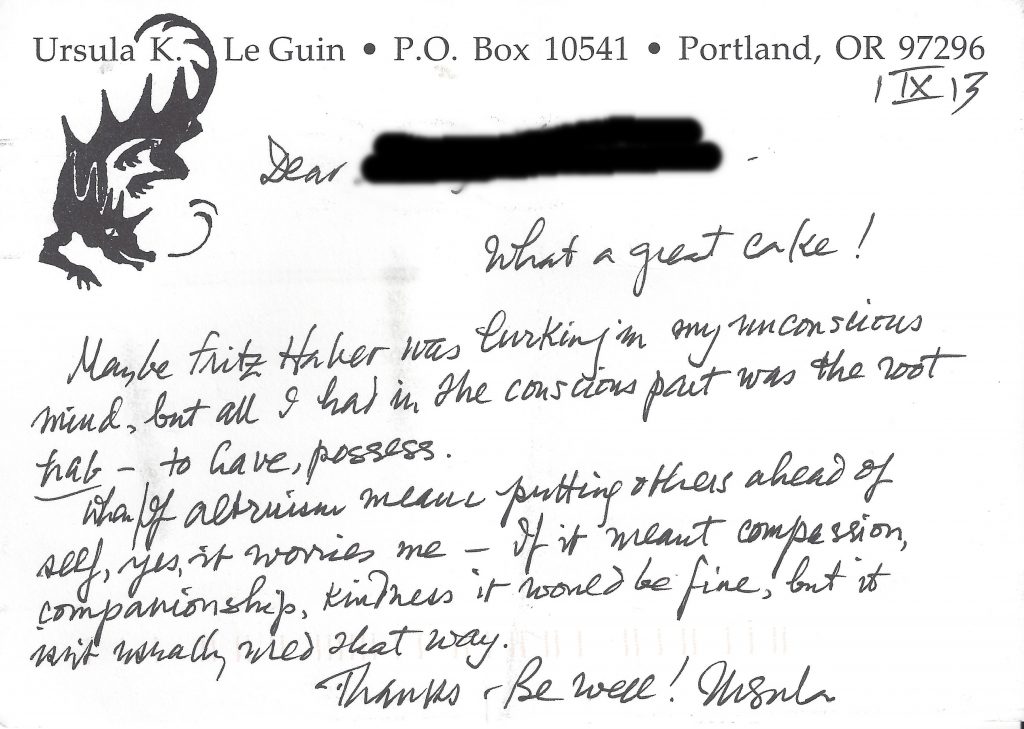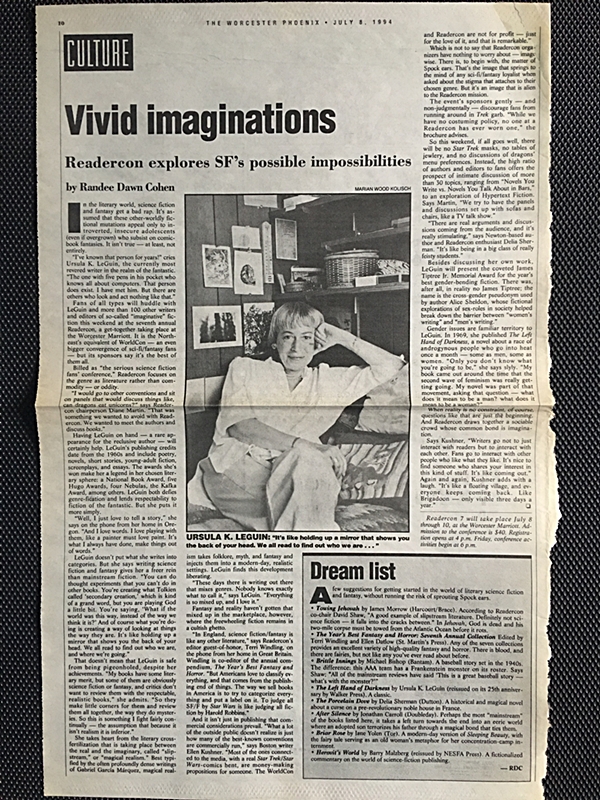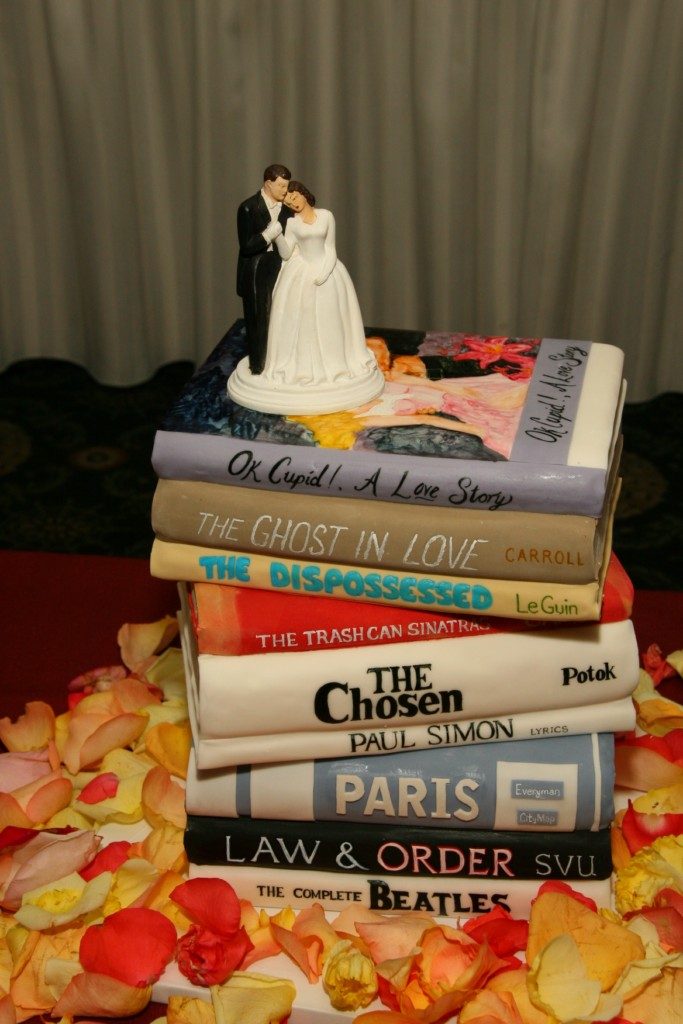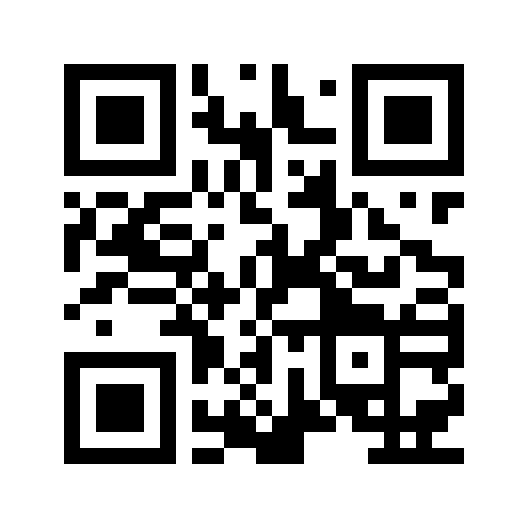7.08.17 Flashback! Ursula K. LeGuin, ahead of 1994’s Readercon: ‘I just always made things out of words’
In 1994, I had my first brush with science fiction/fantasy conventions when The Boston Phoenix asked me to interview Ursula K. LeGuin, who was to be the Guest of Honor (along with Terri Windling) at the 7th annual Readercon. At that time, I still had an image in my head that SFF conventions were all Spock ears and geekery — I didn’t know there was a whole other side to fandom, or that geekery would one day be my way of life, or that one day I’d be on panels and reading at Readercon myself.
All of that is to preface an even more embarrassing fact: I certainly knew who LeGuin was, but I was by no means deeply familiar with her work. I’d read some short stories and The Lathe of Heaven, but really … I was totally in the dark about Readercon and largely in the dark about one of SFF’s great writers. I was definitely not worthy! (I also spoke with Ellen Kushner and Delia Sherman, and the slightly-edited transcript of our chat is here.)
So as I approach what will now be my third Readercon, and the first where I have panels and am reading my own work, I thought I’d dig out the transcript of our chat from 1994. It was done over the phone, and I can’t say there are deep revelations here, except to note that she was extraordinarily kind with me and didn’t call me out for not being totally well-versed in everything about her. Side note: When I met my future husband years later, it turned out he was a huge LeGuin fan, and was blown away by the fact that we’d spoken. I was once again not worthy!
Ursula K. LeGuin transcript
For the Boston Phoenix Readercon report
So, you’ve never been to a Readercon?
LeGuin: No, but I’ve heard really good things about them. It’s kind of unusual. They get really interesting people.
Is being named Guest of Honor really a big honor?
Sure, it’s an honor. I don’t do this kind of thing very much, and I’m not into large groups of people particularly. But it can be fun to talk shop for a few days. I’m sort of shy and inept like most writers, and I like to stay home and write.
Does that make it hard when you need to promote a new book?
It’s lovely to go out — I’ve done some smaller book touring — it’s great to meet people, but it wears you out. I don’t think most writers are really very public people. And that would include me. Definitely. But publishers can be quite frantic about wanting to do it. It does sell books. The thing is you’ve got to weigh that against the next book — I have know writers who have literally lost four or five years for one year of book touring, they’re so worn out, and kind of trashed. With young writers to whom it is too much, and for old writers like me who just get physically worn out.
So how long have you been in the publishing business?
I’ve been publishing since 1962, and writing since about 1900 (laughs).
What are your plans for Readercon?
I’ll do some readings, and I’ll be on panels, and mingle and talk and just be there. I also get to present the Tiptree Award, because I was on the jury and they said I could do that. It’s new, and it’s pretty much within Science Fiction and Fantasy. The idea is that it is goes to a work that is in some way gender bending. It treats gender differently. A good example of it is my book The Left Hand of Darkness, in which the people are androgynous, only they come into heat once a month and you can come into heat as a man or a woman, only you don’t know what you’re going to be. It certainly changes the dating scene. The book is 25 years old now. People in science fiction are exploring “What is gender? How much of it is physical and how much of it do we make up in our mind?”
I think we read about 30 books and short stories for the award. My book came out in ‘69, and that’s about when the second wave of feminism was really getting going, Betty Friedan and people like that. And my novel — I wasn’t clearly aware of it then — but I was part of that movement, asking that question, “What does it mean to be a man? A woman?” We do it differently now, and now we can be much more explicit. The only person I think who beat me to the whole question was Theodore Sturgeon, who wrote Venus Plus X, which was exploring what we mean by gender, and what happens when you fiddle with it.
What keeps you passionate about writing after all this time?
I love to tell a story, and I love words. I love playing with them like a painter must love paint. I do poetry, too, but basically I just love to tell a story. It’s just what I always did, I just always made things out of words. Some of my teachers liked that, some thought I was a little snit.
I don’t write only Science Fiction/Fantasy. I also write straight, realistic fiction. My last major book, Searoad, is just about people who live on the Oregon coast. I write in various genres, and do a lot of young adult and kids stuff, too. So I can go to all kinds of conventions if I want. I started in Science Fiction, it’s where I first made sales and broke in, so I have a real fondness for it.
What makes SF special?
You can do thought experiments in Science Fiction/Fantasy that you can’t do in other books. People who write it are those who like to read it, too. People who don’t read it, you can’t explain, they just don’t get it. But there is intellectual reward in SFF, and that’s combined with a free imagination which is what I love the best, just letting the imagination run but having it skillfully controlled so it makes a story that hangs together. So you’re creating what Tolkien called “secondary creation.” Which is kind of a grand word, but you are playing God a little bit. You’re saying, “What if the world was this way, instead of the way we think it is.” And of course what you’re doing — and of course this is important — is that this is a way of looking at things the way they are. It’s like holding up a mirror that shows you the back of your head. If it wasn’t relevant to us now, what would be the purpose of reading it? We all read to find out who we are, and where we’re going, stuff like that.
There is a genuine escapist streak in fantasy and science fiction just as there is in realism — look at romances and so on. Just pure mindless storytelling, which is absolutely no harm, but it is not as much for me as the stuff that takes on life and chews it up.
That said, there’s something of a “nerd” stigma put onto the genre and its fans.
It is horribly stigmatized. Oh yes. In the colleges if somebody wants to teach science fiction, they’re allowed to do it but they’re looked down upon and may even hurt their career. It’s not called “literature.” Literature for some reason at this point means “realistic fiction” and nothing else, which is really crazy. Because fantasy is the oldest form of literature. Fairy tales, folk tales, myths, epics, you know. We didn’t start by telling realistic stories. It was too boring — who wants to hear about how I went and picked a bushel of berries today? And then, the critics — my books obviously have some literary merit, but some of them are obviously science fiction or fantasy and they don’t want to review them with the respectable, realistic books, so they make little corners for them and review them altogether the way they do mysteries. So this is something I fight fairly continually — the assumption that because it isn’t realism it is inferior. It is completely wrong and so stupid!
What are the chances this will change?
I have hopeful moments and despairing moments. About 15 years ago I think it was really coming out. I’m hopeful at the moment, because what we’re calling “postmodernism” in literature — none of the old labels fit. Everybody is playing games they didn’t used to play, and doing things that used to not be respectable, and Henry James is just no longer the master. There is just so much going on. A writer like Margaret Atwood writes a lot of science fiction. But they don’t label it that because then they would have to face the fact that Margaret Atwood is writing it!
What were professors like when you were in college?
I attended Radcliffe; when I went it wasn’t part of Harvard. It’s so different now. Then it was up to the professor to determine if he would have women in his class. And we had to wear nylons. Hats had just gone out the window before I came, but we were expected to wear pantyhose. No pants. It felt like the dark ages.
I confess I’m new to SFF conventions, and I had this image of people running around in costumes and Spock ears. You know what I mean?
Certainly! And everyone has five pens in his pocket and knows a lot about computers. And those folks exist — I’ve known them for years. But they’re just one of many. A lot of kids today are interested, because science fiction often laps into computer games. But this convention seems more grown up. There is a cute little note in the program book I got for this convention and it says, “There is no rule against wearing costumes at this convention but no one has ever done so.” I was interested to see if I could find a propeller beanie, or a Worf mask. But I won’t have the courage.
How have you seen your career morph over the decades?
A lot of my early books are about men. And after the feminists had hit me on the head long enough to get through, I realized, “Oh, I’m a woman! Maybe I can write about women! Maybe that would be fun!” And so I started writing about women and did that for the next ten years. And now I seem to be back to being concerned about men.
The fact is that literature is still very male dominated, in that most of the older writers who get preserved are men, and all of the old criticism is male, and a lot of the reviewers are male, and a lot of the women we know in books are written by men. And I think the baggage is their baggage, not ours. That was what I learned in the 70s and 80s — that I don’t have to write about women the way men do, in fact I don’t have to write about men the way men do. I had been brought up thinking that writing was this male thing that women are allowed to do. And Virginia Woolf — she was one of the women who really led me out of that bind. She wrote 50 years ago, and she’s still ahead of us. She solved that problem, and talked about it specifically. And how we are expected in a sense to see things men’s way and to make it at once understandable to men.
But as women, I don’t know if that is particularly our job. If we want to sell a lot, it is. Because if we do, we are likely to get written off as “writing to women,” and writing for women is bad but writing for men is good. And we’ve not got around to real equity with that, but boy are we moving fast. When I think all our major novelists are women — starting with Toni Morrison. Some of these amazing Black and Native American women writing now. The voices have changed a lot and I think a lot of the critics aren’t aware of this yet, but the readers are. Pat Murphy, Karen Fowler’s Sarah Canary. You can read it as science fiction if you like, but you don’t have to. A lot of people say “I can’t read science fiction,” and I tell them to read Sarah Canary.
So what is a science fiction or fantasy fan today?
If you label yourself as a fan it probably means you don’t read much else. But I think that some of our best writing is taking place in this area which is not strictly realism. Some of it is science fiction, some of it is fantasy, some of it is magical realism, and some of it is kinda “I don’t know what it is.” And that confounds the reviewers and critics. They want to be able to stick a label on it.
Music at this point is one of the places where everything is mixing and blending and making new stuff all the time. And you get all these wild combinations of punk and country and things that didn’t used to mix are doing so now. And I think the exact same thing is happening in literature. Everything is so mixed up and I love it!
Endnote:
We included LeGuin’s The Dispossessed as part of our wedding cake, which was a stackful of books. My husband wrote to the author to tell her, and received a postcard in return where she answered a question he had about the story!
 See you at Readercon! Here’s my schedule — stop by and say hello!
See you at Readercon! Here’s my schedule — stop by and say hello!
xo,
R
Like what you’re reading? Donate here!



Great interview. Sounds like SF and F writers and readers struggle with a lot of the same stigma that horror writers and readers do.
I think it’s less these days than in 1994, but yeah; I don’t know if genre literary has quite cracked the ceiling for a lot of genre writers yet.